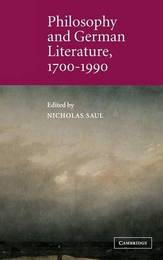
|
Philosophy and German Literature, 1700-1990
Hardback
Main Details
| Title |
Philosophy and German Literature, 1700-1990
|
| Authors and Contributors |
Edited by Nicholas Saul
|
| Series | Cambridge Studies in German |
|---|
| Physical Properties |
| Format:Hardback | | Pages:338 | | Dimensions(mm): Height 229,Width 152 |
|
| Category/Genre | Literary studies - general
History of Western philosophy |
|---|
| ISBN/Barcode |
9780521660525
|
| Classifications | Dewey:830.9384 |
|---|
| Audience | | Professional & Vocational | |
|---|
|
Publishing Details |
| Publisher |
Cambridge University Press
|
| Imprint |
Cambridge University Press
|
| Publication Date |
2 May 2002 |
| Publication Country |
United Kingdom
|
Description
Although the importance of the interplay of literature and philosophy in Germany has often been examined within individual works or groups of works by particular authors, little research has been undertaken into the broader dialogue of German literature and philosophy as a whole. Philosophy and German Literature 1700-1990 offers six chapters by leading specialists on the dialogue between the work of German literary writers and philosophers through their works. The volume shows that German literature, far from being the mouthpiece of a dour philosophical culture dominated by the great names of Leibniz, Kant, Hegel, Marx, Heidegger and Habermas, has much more to offer: while possessing a high affinity with philosophy it explores regions of human insight and experience beyond philosophy's ken.
Author Biography
Nicholas Saul is professor of German and head of department at the University of Liverpool. He is the author of Poetry and History in Novalis and in the Tradition of the German Enlightenment (1984) and Literature and Pulpit Oratory in the German Romantic Age (1999). He is a contributor to the Cambridge History of German Literature. He has also edited volumes on literature and science, and the body in German literature.
Reviews'... a coherent account of the importance of philosophy for German-speaking countries emerges from these six chronologically arranged chapters ... for anyone embarking on a course of study of modern German thought or who is looking for a point of orientation, it can be recommended, not least because it has few competitors.' Modern Language Review
|